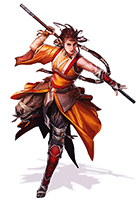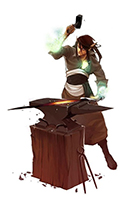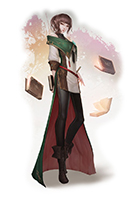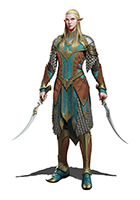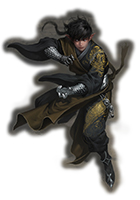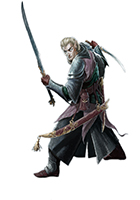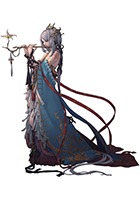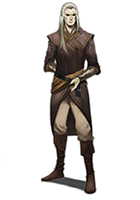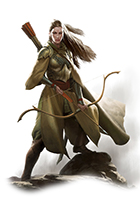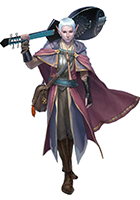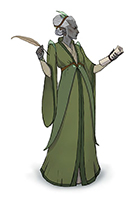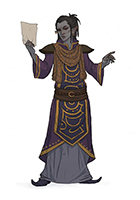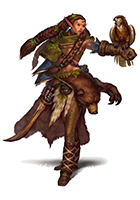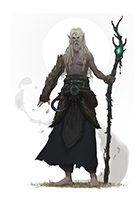Elves
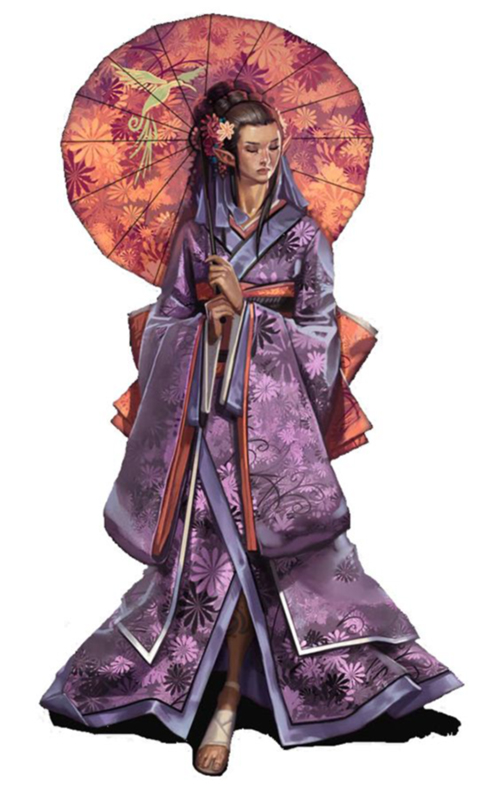 "Wanting for neither grace nor wit, it is yet the tremendous longevity of the elves—exceeding all other mortal races—that have permitted them to hold power over the Imperial Court. While other races clamor for moments of victory, the elven nobility weave plots that may not see fruition for a thousand years."
"Wanting for neither grace nor wit, it is yet the tremendous longevity of the elves—exceeding all other mortal races—that have permitted them to hold power over the Imperial Court. While other races clamor for moments of victory, the elven nobility weave plots that may not see fruition for a thousand years."
- Myngot Damen
A View of the Floating World: Inside the Imperial Court
1102 After
Note: Elves are actually subdivided into four distinct lineages: high, grey, dusk, and frost. When people simply say "elves," they are almost always referring to the high elves, who comprise the largest population and hold the lion's share of the political power. There is also a fifth group—the so-called "wild" elves—but not even the basest of the imperial elves would recognize them as a relation.
Eternally patient and masterfully cunning, the high elves are the unquestioned administrators of the Armant Empire, serving as stewards to the needs of the Corporeal Throne and controlling those functions they deem to be beneath her notice. Theirs is a reputation for haughty clannishness, each elf seen not as an individual, but as a part of their hereditary lineage, expected to sacrifice everything—ambition, love, and freedom—for the good of the family. In return, they are guaranteed lives of privilege and comfort, for even the lowest of these great houses stands on the level of high nobility.
But it is a hard life for a free spirit to endure, and those who balk at such demands are quickly cast aside, exiled from their homes and forced to survive far from the sprawling palaces and manicured gardens that are most elves' birthrights. These outcasts are found in the slums of the lower levels, as menial workers on the farms and fields that surround Armant Proper, or in the ranks of the guilds, where no respectable elf would deign to languish.
Elves are renowned for their appreciation of ascetic beauty, spending centuries carefully shaping nature into a form of idealized minimalism. For the rare, non-elven visitors who manage to see these treasured retreats, it is a stunning experience that is said to capture both the beauty of nature and the limitless potential of their creators' lifespan.
| Contents |
PHYSICAL DESCRIPTION
Lissome and fair, high elves have a reputation for graceful beauty. Of a height with humans, they are thin in both limb and face, and show the least amount of variation between individuals. They are almost universally fair of skin, with hair of pale gold or brown and vibrantly colored eyes; radical variation in any of those qualities is seen as a pollution of "pure" elven blood, casting immediate aspersion on the parentage of any individual so afflicted. Such signs are often enough to bar an aspirant elf from any sort of high office.
But their most famous feature is their long ears. Indeed, elven culture invests a great deal of risqué meaning in their aural excurvations, with the otherwise repressive society fetishizing them and using them as a measure of one's virile energy.
Being reserved with any sort of public displays of emotion, elven fashion works hard to compensate by accentuation, styling the wearer with make-up and carefully selecting their outfits and accessories for best effect. To be seen in public with their hair mussed or clothing ruffled would be akin to social suicide for the rarefied nobility, and it is not unusual for an elven noble to sequester themselves in private for months or even years, rather than appear in public with a problem as simple as poorly-cut hair.
SOCIETY
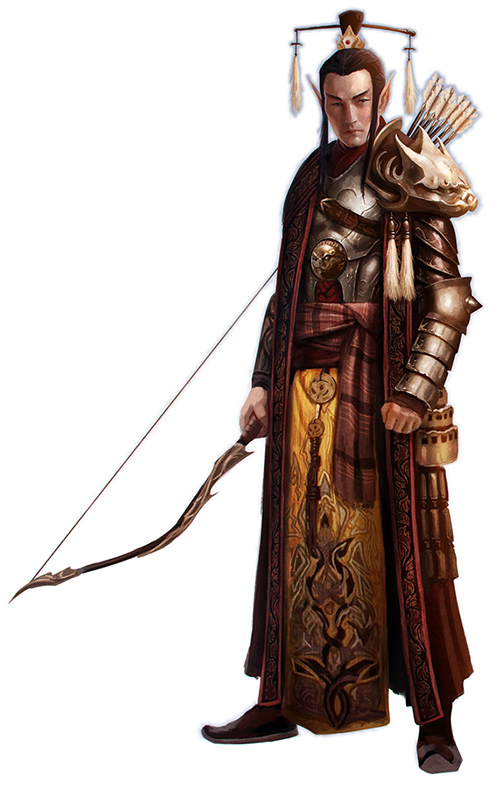 Whether by their nature or simply out of a sense of pragmatism, elves are noted for a near-obsessive focus with the long term: a quality that has made them simultaneously disparaging of shorter-lived races and fantastically suited for administration. From the perspective of other races, however, it also manifests as an unfortunate proclivity towards subsuming individual needs beneath the banner of future benefit.
Whether by their nature or simply out of a sense of pragmatism, elves are noted for a near-obsessive focus with the long term: a quality that has made them simultaneously disparaging of shorter-lived races and fantastically suited for administration. From the perspective of other races, however, it also manifests as an unfortunate proclivity towards subsuming individual needs beneath the banner of future benefit.
The most obvious example of this is in the elven concept of family, being part courtier, part career, and part cult. For the "ideal" elf, there is nothing that takes precedence over family, including their own safety or well-being. Indeed, if pressured to decide between family and the Empire, a dutiful elf would tell you that anything that benefited one would benefit the other, so there would never be a conflict of interest in doing whatever the family required.
Within these families, high elves are expected to show absolute loyalty to their parents and, through them, to the family head, who wields as much power as any historic king ever did over their subjects. Elves value outward calm, stately grace, and a refined bearing in all things, never deigning to show extremes of joy or anger, let alone baser emotions like fear. Out of the public eye, within their own expansive estates, they are known to partake in more sybaritic pleasures, though this relative indulgence is often wildly overblown. Many are the whispered stories of elven debauchery, peasant imaginations turning evenings of poetry recital and tea sampling parties into drug-maddened midnight orgies.
Needless to say, this lifestyle is difficult for even the most disciplined mind to endure for centuries on end, and it is not uncommon for elves to adapt poorly. Some depart before maturity, unable to live with the future they see looming, while others break under the weight of years, fleeing entrenched obligation for the liberty of the lower levels of the city. However they come by it, freedom is one-way road for elves, and if they cast off the shackles of their culture, they are disowned by their families with no road to redemption ever possible. Indeed, so complete is the idea of banishment amongst elves that a house can be absolved in any culpability in an individual's crimes if that individual is disowned (though they may still find themselves pursued by the patient hand of elven justice).
These vagabond elves often find life outside difficult, being easy targets for the anger of those other races who feel oppressed by elven dominance. Usually, they end up gravitating towards menial work or else dangerous lives as adventurers, although there do exist some networks of elven expatriates who look out for other new outcasts.
RELATIONS
High elves exist at the apex of Empire's social structure—only the Empress Herself is more powerful—and they are secure in the knowledge that their arrangement will endure in perpetuity. This race-wide sense of confidence in combination with their emotional self-possession creates an image of superiority that the elves do nothing to disabuse other races of.
That being said, elves are also exceptional pragmatists for whom the big picture is the only picture, and have no issues about working with other races when it benefits them or the Empire in the long run. Outsiders must earn elven respect as individuals, but once they have it, they will find much of the famous elven condescension melting away. They just also need to be aware that they will never earn elven equality.
ALIGNMENT
High elves are a species torn, with individuals naturally inclined towards the freedom of chaotic alignments but pulled from birth towards the rigid organization their lawful culture demands. There is a reason nearly one out of every eight elves will abandon their house at some point in their life.
NAMES
Elven names, much like elven society, place a greater emphasis on the family than the individual. To that end, they are formatted [family name] [given name].
As for the structure of specific names, elven family names tend towards the melodic or flowing, with prominent examples including Aileña, Hyvyre, Silrin, Keimoira, Naemyr, Wrannoriel, Meriraden, and Tiarshys.
Elves do not employ gendered given names, and it is not surprising to find a daughter named after their great-grandfather or a new-born son inheriting the name of an older sister who has died. While they tend to favor given names that are shorter than the family name (so as not to eclipse it), this is not a universal requirement of elven nomenclature, and popular names in the modern age include Oenel, Alea, Ilyran, Ghilein, Luthays, Talansh, Kilaiah, and Neish.
STANDARD RACIAL TRAITS
Ability Score Racial Traits: +2 Dexterity, +2 Intelligence, –2 Constitution. Elves are nimble, both in body and mind, but their form is frail.
Size: Elves are Medium creatures and receive no bonuses or penalties due to their size.
Base Speed: Elves have a base speed of 30 feet.
Languages: Elves begin play speaking Imperial and High Elven. Elves with high Intelligence scores can choose from the following: Celestial, Draconic, Dratha, Ghoran, Huldrani, Sylvan, and Vestran.
Low-Light Vision: Elves can see twice as far as humans in conditions of dim light.
Elven Immunities: Elves are immune to magic sleep effects and gain a +2 racial saving throw bonus against enchantment spells and effects.
Elven Magic: Elves receive a +2 racial bonus on caster level checks made to overcome spell resistance. In addition, elves receive a +2 racial bonus on Spellcraft skill checks made to identify the properties of magic items.
Keen Senses: Elves receive a +2 racial bonus on Perception checks.
Weapon Familiarity: Elves are proficient with longbows (including composite longbows), longswords, rapiers, and shortbows (including composite shortbows), and treat dueling swords and elven curve blades as martial weapons.
SUBRACES
When people say "elf," what they are almost always referring to are the pale-skinned, light-haired high elves, who make up more than half of the total elven population in the Empire. But—though numerous—they are not the only group of elves to wield influence in Armant. The following groups share all the above racial traits with the high elves, except where noted.
Dusk Elf
Cunning and insular, even by elven standards, the dusk elves have a not-undeserved reputation for cruelty that sets them apart from their cousin elves. Unlike their fellows' famous connection to nature, the dusk elves are drawn to the night, with many families holding to ancient traditions that celebrate the moons and stars, or even the subterranean darkness found in the extensive cave networks that riddle Kharak Knives to the west of Armant Proper. Part of this connection may be the fact that—unlike the other elven groups—dusk elves enter into actual sleep at night, instead of the meditative reverie, though they still need only four hours of rest a night.
Obsessed with minutiae, many dusk elves find themselves drawn to academia, law, or accountancy, and that predilection has helped position their relatively small numbers in places of disproportionate influence. Physically, the most notable difference between a dusk elf and their cousins is the tone of their skin, which ranges from pallid grey through to dark black. Ruder company will refer to dusk elves as "dark elves" or even by the obscene pejorative "drow."
Arcane Focus: Dusk elves have little interest in maintaining any sort of martial tradition, but their ability to focus on the details of a process to the exclusion of all distraction can serve them well, especially with the complexities of magic. Dusk elves gain a +2 racial bonus on concentration checks made to cast arcane spells defensively. This racial trait replaces weapon familiarity.
Darkvision: Dusk elves' connection with darkness means they are born with the ability to see no matter how dark it grows. Dusk elves gain darkvision with a range of 60 feet. This racial trait replaces low-light vision.
Dreamspeaker: Dusk elves have the ability to tap into the power of the night with which they are associated. Dusk elves add +1 to the saving throw DCs of spells of the divination school and sleep effects they cast. In addition, dusk elves with Charisma scores of 15 or higher may use dream once per day as a spell-like ability (caster level is equal to the elf's character level). This racial trait replaces elven immunities.
Languages: Dusk elves begin play speaking Imperial and Dratha. Elves with high Intelligence scores can choose from the following: Celestial, Draconic, Drathim Hand-Sign, Ghoran, High Elven, Huldrani, and Vestran.
Frost Elf
The mountains of the Kharak Knives form a solid wall to the north and west of the Empire, and are a hard border beyond which Imperial power does not extend. Yet passing over those peaks will bring the bravest adventurers to the endless sprawl of the Vunta, the great tundra where only reindeer and mammoth dwell. But eight hundred years ago, explorers from Armant discovered that the Vunta was not quite as abandoned as believed, when they encountered a tribe of waxen, white-eyed elves: the huldra.
Following that encounter, almost the entire population of what would come to called "frost elves" migrated en masse to Armant, leaving behind only small conclaves of the most dogmatic or conservative of their fellows. Since then, they have shown themselves to be hardy and quiet; dour even by elven standards. But they are also industrious to the extreme and loyal without question with allies who have proven their worth. Indeed, more than a few scholars have noted that—culturally—they have more in common with the dwarves than their fellow elves, which goes a long way to explaining why those two groups get along so well.
Ability Score Racial Traits: +2 Dexterity, +2 Wisdom, –2 Charisma. Frost elves are as agile as their cousins, but are more interested in common sense than knowledge for knowledge's sake and have difficulty dealing with outsiders. This racial trait replaces the standard elven ability score modifiers.
Elemental Resistance: Forged in one of the most extreme environments in the world, frost elves developed a natural resistance to the dangers of their homelands over the course of generations. Frost elves gain energy resistance 5 to cold. This racial trait replaces elven immunities.
Tundra Walker: Frost elves endured for hundreds—or perhaps thousands—of years amidst the harsh winters and short summers of the Vunta, and it hardened them. Frost elves receive a +4 racial bonus on Constitution checks and Fortitude saves to avoid fatigue, exhaustion, or ill effects from running, forced marches, starvation, thirst, or cold environments. This racial trait replaces elven magic.
Languages: Frost elves begin play speaking Imperial and Huldrani. Elves with high Intelligence scores can choose from the following: Aquan, Draconic, Dwarn, Dratha, Ghoran, and High Elven.
Grey Elf
Historical records from the time before the Dark One's War hint at the rise of the grey elves, sometimes referred to as "tower elves" for reasons that are unclear to modern scholars. When it first began, the new subrace was thought to be some sort of disease, and later seen as a weakness in certain bloodlines as some elves began to lose their connection to nature. Even as children, it was obvious that something was different about these elves, for they seemed less vibrant than their peers and even the color of their eyes seemed duller. By the time the cause was identified—and here the historical records are vague or incomplete—it was too late to quash the existence of this new group.
Since then, the grey elves have grown in number, until they are now the second-largest population of elves, and they show no indication of slowing down. Indeed, it has been noted that the birth rate amongst the grey elves far and away outstrips that of their cousins. By now, they might even have surpassed the high elves as the most numerous, except for another quality that is different from other elves: gregariousness. Grey elves are nearly human in their desire for new experiences which, when combined with their long lifespans, means that they encounter a relatively overwhelming number of dangerous situations, and that has proven the largest limiting factor on their population.
New Experiences: Rather than focus on the traditional ways of the elves, grey elves are drawn to new experiences and put the long years of their youth to use mastering whatever catches their fancy. Grey elves gain Skill Focus as a bonus feat. This racial trait replaces elven magic and weapon familiarity.
Urbanite: Grey elves are much more in touch with the ebb and flow of social situations, confining themselves less often to the isolated manners of their kin. Grey elves gain a +2 racial bonus on Diplomacy and Sense Motive checks. This racial trait replaces keen senses.
Wild Elf
West of Armant Proper, sandwiched between the coastal Lacustrine plains and the forbidding wall of the Kharak Knives are the forested hills and deep valleys of the Feyfold. It is in this untamed wilderness that the wild elves live, free of any ties to the Armant Empire and unrecognized by any of their more civilized cousins.
Parochial and xenophobic, they form dozens of small, tribal bands that spend much of their time feuding with one-another in a complex series of alliances and betrayals that seem like utter chaos to outsiders. Indeed, outsiders are the only thing that will cause the clans unite, making them one of the largest hurdles for westward Imperial expansion. Still, this does not stop some of the tribes on the fringe of Armant territory from trading furs and forest herbs with Imperial citizens when they're not conducting raids on their forts and camps.
Dark-haired and brown-skinned, the wild elves—also disparagingly called "savage elves"—are more physically robust than the other subraces, though their rural lifestyle also leaves them less inclined towards academic pursuits. As if that were not enough to distinguish them, the wild elves also eschew any civilized sense of decorum, adorning themselves with hides and furs, jewelry made of feathers, bones, and other animal parts, and painting their bodies with colorfully-dyed muds.
Ability Score Racial Traits: +2 Dexterity, +2 Charisma, –2 Intelligence. Wild elves are swift and possessed of forceful personalities, but they have little patience for formal education. This racial trait replaces the standard elven ability score modifiers.
Fleet-Footed: While all elves are naturally lithe and agile, those of the forest kith seem almost unnaturally so, their bodies suffused with the innate magic of their elven nature. Wild elves receive Run as a bonus feat and gain a +2 racial bonus on initiative checks. This racial trait replaces elven immunities.
Woodcraft: Wild elves know the deep secrets of the wild like no others, especially secrets of the forests. Wild elves gain a +1 racial bonus on Knowledge (nature) and Survival checks. In forest terrain, these bonuses improve to +2. This racial trait replaces elven magic.
Weapon Familiarity: Wild elves are proficient with handaxes, longbows (including composite longbows), shortbows (including composite shortbows), and throwing axes, and they treat harpoons as martial weapons. This racial trait replaces the standard elven weapon familiarity.
Languages: Wild elves begin play speaking Sylvan. Elves with high Intelligence scores can choose from the following: Draconic, Ghoran, Giant, Gnoll, Imperial, Phryss, and Wemic.
ALTERNATE RACIAL TRAITS
By sacrificing some of their standard racial traits, characters can instead select alternate traits that reflect the nuances of their upbringing and culture.
Ageless Patience
Replaces Elven Magic and Keen Senses (High Elf, Dusk Elf)
Some families of elves have developed traditions of conservatism that shorter-lived races could never hope to match. This attitude, combined with elven longevity, produces elves of extraordinary patience, who can produce better results when taking their time than they could under time constraints. These elves gain a +2 racial bonus when taking 20 on skill checks.
Disinterested Observer
Replaces Elven Magic and Weapon Familiarity (High Elf)
Replaces Elven Magic and Arcane Focus (Dusk Elf)
Elves who are frequently forced interact with other species often come to rely on their ability to wait out such impatient races. These elves gain a +1 racial bonus on attack rolls and skill checks made as part of readied actions in combat.
Elven Arrogance
Replaces Languages (High Elf, Dusk Elf, Frost Elf, Wild Elf)
Some elves are so convinced of elven superiority, or else otherwise so xenophobic, that they have difficulty seeing the point in communicating with "lesser" races. Their racial bonus on saving throws against enchantments increases by 1 (to +3) against such effects from non-elf humanoids, but they begin play without speaking Imperial, and if they have high Intelligence scores, they can select bonus languages from only Celestial, Draconic, and Sylvan. If they have more bonus languages than options presented here, they lose those additional languages known. This trait does not prevent them from selecting additional languages with Linguistics as normal.
Illustrious Urbanite
Replaces New Experiences (Grey Elf)
Grey elves have a remarkable ability to combine magic harmoniously with their surroundings. They gain Spell Focus with conjuration, illusion, or transmutation spells as a bonus feat. When casting spells of this school, the elves can choose to have the spell leave undamaged any building or structure that would normally be affected.
Lightbringer
Replaces Elven Immunities and Elven Magic (High Elf)
Replaces Elemental Resistance and Tundra Walker (Frost Elf)
Replaces Fleet-Footed and Woodcraft (Wild Elf)
Many elves revere the sun, moon, and stars, but some are literally infused with the radiant power of the heavens. Elves with this racial trait are immune to light-based blindness and dazzle effects, and are treated as one level higher when determining the effects of any light-based spell or effect they cast (including spell-like and supernatural abilities). Elves with Intelligence or Charisma scores of 10 or higher may use light at will as a spell-like ability; choose which ability score to use at character creation.
Overwhelming Magic
Replaces Elven Magic and Weapon Familiarity (High Elf)
Replaces Elven Magic and Arcane Focus (Dusk Elf)
Replaces Tundra Walker and Weapon Familiarity (Frost Elf)
Replaces New Experiences (City Elf)
Some elves obsess over the fundamentals of magic, training for decades to add layers of potent spellwork before they ever begin practicing true spells. This builds a foundation that makes their magic increasingly difficult to resist. These elves gain Spell Focus as a bonus feat.
Perfect
Replaces Elven Immunities (High Elf)
Replaces Dreamspeaker (Dusk Elf)
The eerie beauty of some elves cannot be denied. Elves with this racial trait receive a +1 racial bonus on Bluff and Diplomacy checks against humanoids and a +2 racial bonus on saving throws against transmutation spells and spell-like effects
Slender
Replaces Elven Immunities (High Elf, Grey Elf)
Replaces Dreamspeaker (Dusk Elf)
Replaces Elemental Resistance (Frost Elf)
Replaces Fleet-Footed (Wild Elf)
Elves often appear unnaturally thin by other races' standards. Elves with this trait gain a +2 racial bonus on Escape Artist checks, on combat maneuver checks to escape a grapple, and to CMD against grapples.
Spirit of the Waters
Replaces Elven Magic and Weapon Familiarity (High Elf)
Replaces Weapon Familiarity and Woodcraft (Wild Elf)
Some elves have adapted to life in tune with the sea or along the reedy depths of wild rivers and lakes. They gain a +4 racial bonus on Swim checks, can always take 10 while swimming, and may choose Aquan as a bonus language. They are proficient with longspear, trident, and net.
FAVORED CLASS OPTIONS
Instead of receiving an additional skill rank or hit point whenever they gain a level in a favored class, Elves have the option of choosing from a number of other bonuses, depending upon their favored class. The following options are available to all Elves who have the listed favored class:
Alchemist: Add one extract formula from the alchemist's list to his formula book. This formula must be at least one level lower than the highest-level formula the alchemist can create.
Barbarian: Add +1 to the barbarian's base speed. In combat, this option has no effect unless the barbarian has selected it five times (or another increment of five). This bonus stacks with the barbarian's fast movement feature and applies under the same conditions as that feature.
Bard: Add +1 to the bard's CMD when resisting a disarm or sunder attempt.
Cavalier: Add +1 hit point to the cavalier's mount. If the cavalier ever replaces his mount, the new mount gains these bonus hit points.
Cleric: Select one domain power granted at 1st level that is normally usable a number of times per day equal to 3 + the cleric's Wisdom modifier. The cleric adds +1/2 to the number of uses per day of that domain power.
Druid: Add +1/3 to the druid's natural armor bonus when using wild shape.
Fighter: Add +1 to the fighter's CMD when resisting a disarm or sunder attempt.
Hunter: Choose a weapon from the those affected by the character's Weapon Familiarity racial trait (or would be affected, if they replaced the trait). Gain a +1/2 bonus on critical hit confirmation rolls made while using that type of weapon (maximum bonus +4). This bonus does not stack with those gained through Critical Focus and similar effects.
Inquisitor: Add one spell known from the inquisitor's spell list. This spell must be at least one level below the highest-level spell the inquisitor can cast.
Investigator: Increase the total number of points in the investigator's inspiration pool by +1/3.
Kineticist: Gain a +1/4 bonus on damage rolls that apply the kineticist's elemental overflow bonus.
Magus: The magus gains +1/6 of a new magus arcana.
Medium: Gain a +1/3 bonus on all skill checks using occult skill unlocks.
Monk: Add +1 to the monk's base speed. In combat this option has no effect unless the monk has selected it five times (or another increment of five). This bonus stacks with the monk's fast movement class feature and applies under the same conditions as that feature.
Occultist: Increase the occultist's total number of points of mental focus by +1/2 point.
Oracle: Add +1/6 to the oracle's level for the purpose of determining the effects of one revelation.
Paladin: Add +1/2 hit point to the paladin's lay on hands ability (whether using it to heal or harm).
Ranger: Choose a weapon from the those affected by the character's Weapon Familiarity racial trait (or would be affected, if they replaced the trait). Add +1/2 on critical hit confirmation rolls made while using that weapon (maximum bonus of +4). This bonus does not stack with Critical Focus.
Rogue: Add +1 to the number of times per day the rogue can cast a cantrip or 1st-level spell gained from the minor magic or major magic talent. The number of times this bonus is selected for the major magic talent cannot exceed the number of times it is selected for the minor magic talent. The rogue must possess the associated rogue talent to select these options.
Skald: Increase the bonus granted by the well-versed class feature by +1/4 (maximum +8).
Sorcerer: Choose a terrain type from the ranger's favored terrain list. When casting sorcerer spells in the chosen terrain, add +1/3 to the effective caster level of the spell, for the purpose of determining the spells' duration.
Spiritualist: Add +1/6 to the shield bonus granted by the 3rd-level ectoplasmic bonded manifestation ability.
Summoner: The amount of time the summoner must spend to summon his eidolon is reduced by 1 round, to a minimum of 1 round.
Swashbuckler: Increase the total number of points in the swashbuckler's panache pool by +1/4.
Vigilante: Gain +1/3 on all Acrobatics, Climb, and Stealth checks in forested areas.
Witch: Add a +1/2 bonus on Spellcraft checks to identify cursed items and on Sense Motive checks to notice enchantment or possession.
Wizard: Select one arcane school power at 1st level that is normally usable a number of times per day equal to 3 + the wizard's Intelligence modifier. The wizard adds +1/2 to the number of uses per day of that arcane school power.
GALLERY
Presented here are appearances typical of elves across the Armant Empire.

